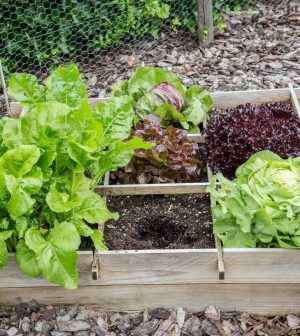- Could Your Grocery Store Meat Be Causing Recurring UTIs?
- Are You Making This Expensive Thermostat Error This Winter?
- Recognizing the Signs of Hypothyroidism
- 10 Strategies to Overcome Insomnia
- Could Artificial Sweeteners Be Aging the Brain Faster?
- Techniques for Soothing Your Nervous System
- Does the Water in Your House Smell Funny? Here’s Why
- Can a Daily Dose of Apple Cider Vinegar Actually Aid Weight Loss?
- 6 Health Beverages That Can Actually Spike Your Blood Sugar
- Treatment Options for Social Anxiety Disorder
Even a Small Urban Garden Can Boost Your Microbiome

A small urban garden can contribute to your health, especially if the garden contains rich soil, a new study shows.
A one-month indoor gardening period increased the bacterial diversity of participants’ skin and appeared to improve their response to inflammation, researchers found.
Growing, harvesting and consuming food produced in an urban garden every day could help city dwellers fend off disease, researchers suggested.
“The findings are significant, as urbanization has led to a considerable increase in immune-mediated diseases, such as allergies, asthma and autoimmune diseases, generating high healthcare costs. We live too ‘cleanly’ in cities,” said lead study author Mika Saarenpaa, a doctoral researcher with the University of Helsinki in Finland.
“We know that urbanization leads to reduction of microbial exposure, changes in the human microbiota and an increase in the risk of immune-mediated diseases,” Saarenpaa added in a university news release. “This is the first time we can demonstrate that meaningful and natural human activity can increase the diversity of the microbiota of healthy adults and, at the same time, contribute to the regulation of the immune system.”
For this study, participants gardened using regular flower boxes, using plants bought off a store shelf. The crops included peas, beans, mustards and salads.
A group of 15 people gardened using naturally derived and microbially rich soil, while another control group of 13 gardened with microbially poor peat-based soil.
Peat is the most widely used growing medium in the world, researchers said.
However, the people in the control group had no improvements in inflammatory response or skin bacteria, indicating that peat-based gardening does not bring the health benefits of gardening in diverse forest soil.
The improvements among the people toiling with rich soil could theoretically lead to better health by improving immune response to illness, researchers said.
The new study was published recently in the journal Environment International.
“If gardening turns into a hobby, it can be assumed that the regulation of the immune system becomes increasingly continuous,” Saarenpaa said.
Based on these findings, Saarenpaa said schools and parents should consider having children garden with rich soil, since the development of the immune system is most active in childhood.
“My research emphasizes the dependence of our health on the diversity of nature and that of soil in particular,” Saarenpaa said. “We are one species among others, and our health depends on the range of other species. Ideally, urban areas would also have such a diverse natural environment that microbial exposure beneficial to health would not have to be sought from specifically designed products.”
More information
The Mayo Clinic has more about the health benefits of gardening.
SOURCE: University of Helsinki, news release, May 23, 2024
Source: HealthDay
Copyright © 2026 HealthDay. All rights reserved.










